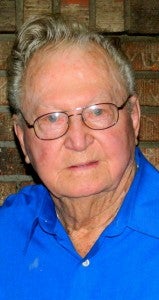Sam Davis WWII Veteran
Published 4:01 pm Wednesday, May 21, 2014
In 1945 then 21 years old JDC native Sam Davis came into Europe with the 2nd wave of soldiers after D-Day. The 41st Armored Infantry Regiment of the 2nd Armored Division was to take bridges from enemy hands and make them safe for advancing allied troops.
“After the Battle of the Bulge I was with the first troops into Berlin. We got on the roads some 15-20 miles behind enemy lines taking the main highways so they couldn’t get materials and troops moved. I lost quite a few friends there but I had a praying mama. There were lots of times I thought I might not get home, though.
At the Elbe River we were some 40 miles outside of Berlin’s Russian east front.
Patton at the Rhine had said he was going to beat Germany if it took a boxcar load of dog tags and we felt it just might be ours in that boxcar.
We made it to the Elbe River and the Russians started taking Berlin. My company was picked to make the initial crossing of the Elbe. A, B and C Company put us in fishing boats and paddleboats. The river was 200 yards wide and they were ordered regardless of what happened to keep paddling. We figured the Germans were waiting on the other side to riddle us with bullets. They had the biggest MI rifles but had not fired.
Our orders were to go out 1,000 yards, and dig in foxholes. The ground was hard to dig but we did get two holes dug.
Daylight came and a big wheel (officer) spotted a bridge ¼ mile away and wanted to take it. We had a little skirmish and the Germans lost some men but we didn’t.”
While we surrounded the bridge we heard some heavy rumbling off a ways and thought it was our tank support coming, but some one said, ‘Oh, boys, that’s com’n from the wrong direction!’
German tanks pulled in front of where we were dug in and our first sergeant was killed. The tanks were right on us and we had to run back where we came from and go back down the river. We had to walk down the Elbe River under the cover of darkness that night. German planes dropped flares and we would hit the ground but wouldn’t shoot. The Germans had captured some of ours and mixed them in with their troops so we couldn’t shoot. If we did we might hit our own men.
About 10 of us hid in a German cellar for a while. Some of the men wanted to leave and when the artillery let up two left to make a break for it and we never saw them again.
When the gunfire did let up we made it to the river. The Ducks (Amphibian boats) were across the river and they saw us so they started to come across and we met them in the water. There was a soldier with a 50-caliber machine gun mounted in front and he kept firing to give us cover. Men were hanging on the sides of the boat covering it trying to get in. Someone reached down and pulled me up on the side. I was right under the big gun and as he fired the burning hot bullet hulls were hitting me in the back. I thought I was being shot over and over. When they pulled me all the way into the boat I couldn’t stop shaking. The medics gave me a shot so I would go to sleep. They gave me shots every time I would wake up still shaking and kept me asleep for 3 days. When I woke up and wasn’t trembling any more the corporal medic looked at me and said, ‘Well, I won the bet! Captain bet me you wouldn’t snap out of it but I bet him you would.’
I got over it alright but even now if I get excited I’ll go into jerks.”
There was a long pause of silence in the room. I sat stunned by what this brave man had experienced and Davis relived the nightmare of war and saw the ghosts of valiant friends who never came home.
I spoke but could barely get above a whisper, “Thank you for your service.”
We have set aside Memorial Day to remember the men like the comrades of Sam Davis who gave all and to honor those who returned home changed by the experiences of war or service to their country.
We collectively say to all, thank you for your service.

Shirley Burnham / The Prentiss Headlight—Sam Davis, now 90, still has vivid memories of his service in WWII. Davis served in some of the heaviest conflicts in Germany during WWII.





